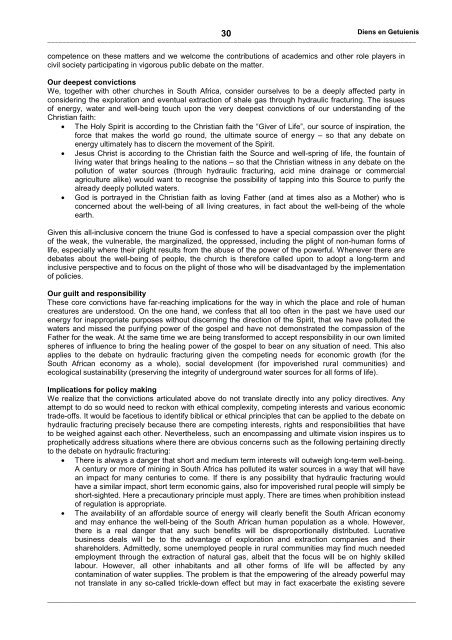You also want an ePaper? Increase the reach of your titles
YUMPU automatically turns print PDFs into web optimized ePapers that Google loves.
30<br />
Diens en Getuienis<br />
_________________________________________________________________________________________________<br />
competence on these matters and we welcome the contributions of academics and other role players in<br />
civil society participating in vigorous public debate on the matter.<br />
Our deepest convictions<br />
We, together with other churches in South Africa, consider ourselves to be a deeply affected party in<br />
considering the exploration and eventual extraction of shale gas through hydraulic fracturing. The issues<br />
of energy, water and well-being touch upon the very deepest convictions of our understanding of the<br />
Christian faith:<br />
• The Holy Spirit is according to the Christian faith the “Giver of Life”, our source of inspiration, the<br />
force that makes the world go round, the ultimate source of energy – so that any debate on<br />
energy ultimately has to discern the movement of the Spirit.<br />
• Jesus Christ is according to the Christian faith the Source and well-spring of life, the fountain of<br />
living water that brings healing to the nations – so that the Christian witness in any debate on the<br />
pollution of water sources (through hydraulic fracturing, acid mine drainage or commercial<br />
agriculture alike) would want to recognise the possibility of tapping into this Source to purify the<br />
already deeply polluted waters.<br />
• God is portrayed in the Christian faith as loving Father (and at times also as a Mother) who is<br />
concerned about the well-being of all living creatures, in fact about the well-being of the whole<br />
earth.<br />
Given this all-inclusive concern the triune God is confessed to have a special compassion over the plight<br />
of the weak, the vulnerable, the marginalized, the oppressed, including the plight of non-human forms of<br />
life, especially where their plight results from the abuse of the power of the powerful. Whenever there are<br />
debates about the well-being of people, the church is therefore called upon to adopt a long-term and<br />
inclusive perspective and to focus on the plight of those who will be disadvantaged by the implementation<br />
of policies.<br />
Our guilt and responsibility<br />
These core convictions have far-reaching implications for the way in which the place and role of human<br />
creatures are understood. On the one hand, we confess that all too often in the past we have used our<br />
energy for inappropriate purposes without discerning the direction of the Spirit, that we have polluted the<br />
waters and missed the purifying power of the gospel and have not demonstrated the compassion of the<br />
Father for the weak. At the same time we are being transformed to accept responsibility in our own limited<br />
spheres of influence to bring the healing power of the gospel to bear on any situation of need. This also<br />
applies to the debate on hydraulic fracturing given the competing needs for economic growth (for the<br />
South African economy as a whole), social development (for impoverished rural communities) and<br />
ecological sustainability (preserving the integrity of underground water sources for all forms of life).<br />
Implications for policy making<br />
We realize that the convictions articulated above do not translate directly into any policy directives. Any<br />
attempt to do so would need to reckon with ethical complexity, competing interests and various economic<br />
trade-offs. It would be facetious to identify biblical or ethical principles that can be applied to the debate on<br />
hydraulic fracturing precisely because there are competing interests, rights and responsibilities that have<br />
to be weighed against each other. Nevertheless, such an encompassing and ultimate vision inspires us to<br />
prophetically address situations where there are obvious concerns such as the following pertaining directly<br />
to the debate on hydraulic fracturing:<br />
• There is always a danger that short and medium term interests will outweigh long-term well-being.<br />
A century or more of mining in South Africa has polluted its water sources in a way that will have<br />
an impact for many centuries to come. If there is any possibility that hydraulic fracturing would<br />
have a similar impact, short term economic gains, also for impoverished rural people will simply be<br />
short-sighted. Here a precautionary principle must apply. There are times when prohibition instead<br />
of regulation is appropriate.<br />
• The availability of an affordable source of energy will clearly benefit the South African economy<br />
and may enhance the well-being of the South African human population as a whole. However,<br />
there is a real danger that any such benefits will be disproportionally distributed. Lucrative<br />
business deals will be to the advantage of exploration and extraction companies and their<br />
shareholders. Admittedly, some unemployed people in rural communities may find much needed<br />
employment through the extraction of natural gas, albeit that the focus will be on highly skilled<br />
labour. However, all other inhabitants and all other forms of life will be affected by any<br />
contamination of water supplies. The problem is that the empowering of the already powerful may<br />
not translate in any so-called trickle-down effect but may in fact exacerbate the existing severe<br />
_________________________________________________________________________________________________


